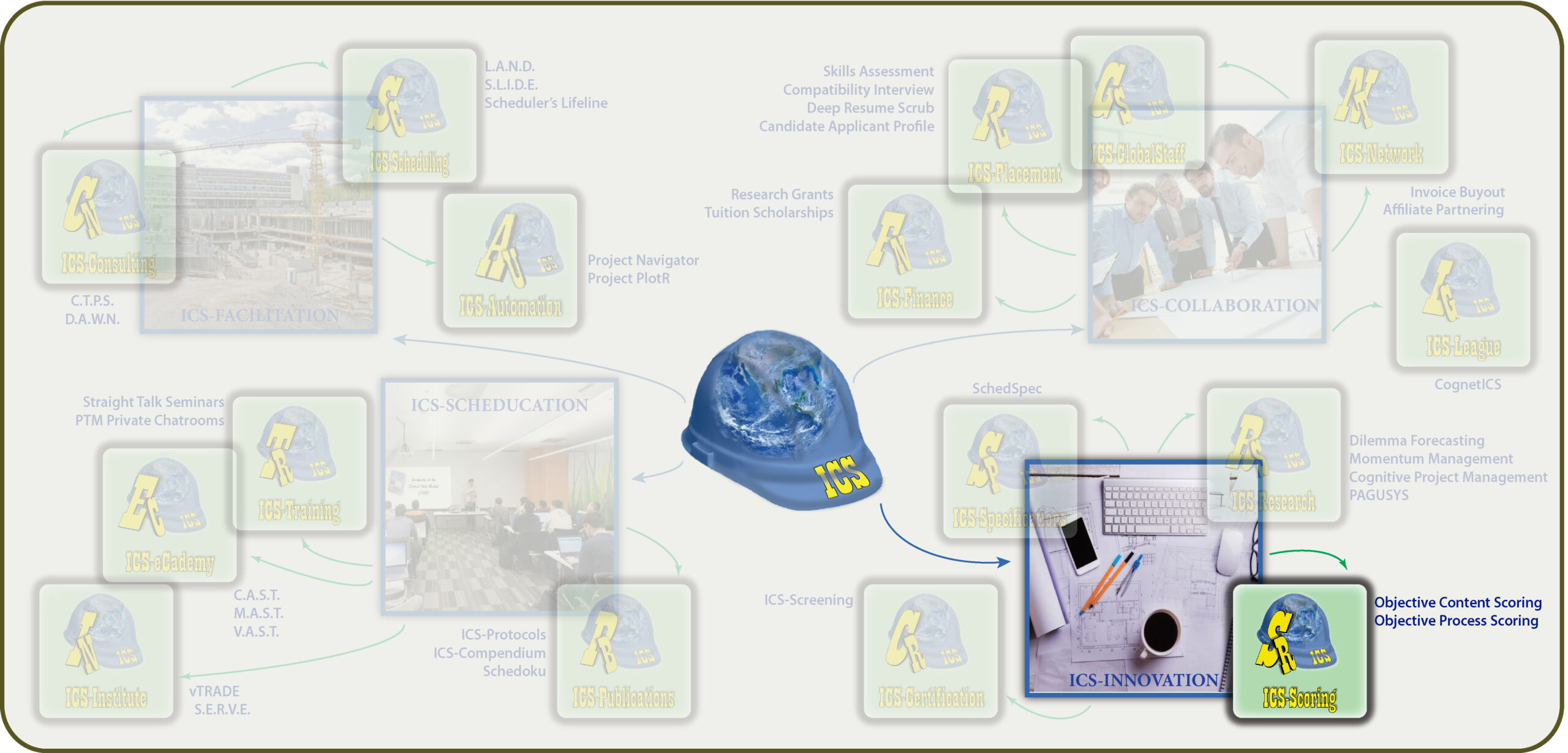What ICS-Scoring Is All About
ICS-Scoring operates an independent appraisal service that objectively evaluates and rates project-specific Construction PTM products and services.
ICS-Specifications and ICS-Scoring are paired in a push-pull effort relationship that collectively improves the overall quality and effectiveness of Construction PTM, regardless of project characteristics. Where ICS-Specifications (the push) raises the bar when it comes to what Owners require of a Contractor’s Construction PTM effort, ICS-Scoring (the pull) ensures that the higher bar is cleared by grading Construction PTM efforts in real time.
ICS-Specifications and ICS-Scoring are paired in a push-pull effort relationship that collectively improves the overall quality and effectiveness of Project Time Management products and services across the entire construction spectrum. ICS-Specifications (the push) raises the bar when it comes to what Owners require of a Contractor’s Construction PTM effort. Then, ICS-Scoring (the pull) grades those efforts in real time, ensuring that the higher bar is cleared.
Expressed in contract language generated by SchedSpec, ICS-Specifications enforces an ICS-Compendium recommendation, that an ICS-Score must accompany every submission of a Baseline Schedule, Time Impact Analysis, or Time Extension Request. Availability of objective, per-project scoring, especially if reinforced contractually, promises to dramatically improve the quality of Construction PTM in North America.
Why ICS-Scoring Was Created
Few are the Owners, Construction Managers, Design Professionals, or Contractors who have the knowledge and experience to technically critique either a Project Schedule, or the processes that design, develop, maintain, and use it. Thought Leadership in the Construction PTM world have recognized a need for some kind of grading system, and two initiatives have gathered a following in recent years:
While both efforts are to be commended for increasing user awareness as to what makes, or breaks a Project Schedule, their work products are, in the opinion of ICS-Research, not especially well suited for Construction PTM in North America. Let us begin by explaining who these entities are and follow with why we consider them inappropriate for Construction PTM purposes.
About DCMA 14-Point Schedule Health Metrics
The DCMA 14-Point Schedule Health Metrics are the work product of the Defense Contract Management Agency, which is a U.S. Federal agency responsible for administering contracts for the Department of Defense and other authorized federal agencies (e.g., NASA, Department of Energy, Department of Treasury, etc.). The DCMA 14-point Schedule Assessment suggests that fourteen metrics can offer a qualitative and quantitative evaluation of the schedule.
About the GAO Schedule Assessment Guide
The GAO Schedule Assessment Guide is the work product of the U.S. General Accountability Office. From its website, “the GAO, often called the “congressional watchdog,” is an independent, non-partisan agency that works for Congress. GAO examines how taxpayer dollars are spent and provides Congress and federal agencies with objective, non-partisan, fact-based information to help the government save money and work more efficiently. This document provides ten best practices “to help managers and auditors ensure that the program schedule is reliable.”
Why These Otherwise Noble Efforts Are Ill-Suited for Construction PTM in North America
Keep in mind that the sole focus of ICS-Global and its sixteen Operational Divisions is to promote successful completion of mid-sized to large construction project undertaken in North America.
With this set of observations in mind, ICS-Research conceived of an independent scoring system that would (a) consider both the Schedule and the Scheduling, and (b) make it responsive to the kind of projects that ICS-Global is committed to support.
Whom ICS-Scoring Is Intended to Serve
An independent means of evaluating the credibility and viability of both the Project Schedule and the Construction PTM processes that work with that Project Schedule should be of supreme interest to Owners, Construction Managers, Design Professionals, or Contractors alike.
The concept behind ICS-Scoring is far more than just a grading system, as is the DCMA 14-Point Schedule Health Metrics. It is a recommended process for requiring the securing of an ICS-Score as part of Schedule-related submittals.
Plus, keep in mind that the ICS-Score has two component parts: An Objective Content Score and an Objective Process Score. Combined, they paint a far more realistic picture of the ability of the Construction PTM program to effectively use time on the Project. Read individually, they provide the Project Team with helpful insights into where their Construction PTM program can be improved.
How ICS-Scoring Is Organized and Functions
Perhaps the single most significant contribution that ICS‑Global can make to Construction PTM is the establishment of an independent scoring system, called Objective Scoring, a service that will impartially and independently evaluate and grade the integrity of both the Schedule itself, and the Scheduling Management processes.
Correspondingly, Objective Scoring subdivides into Objective Content Scoring (which evaluates the merits of the Schedule as a standalone Project Management tool) and Objective Process Scoring. The latter evaluates the merits of the Contractor’s Construction PTM progam, including the relationship between Scheduling and other Project Management functions.
There is a symbiotic relationship between Objective Scoring and SchedSpec. SchedSpec establishes the performance criteria for both the Schedule and Construction PTM, and Objective Scoring ensures compliance with those parameters.
From a practical perspective, think of an ICS‑Score as a “FICO score for Scheduling.” While the ICS‑Score can be applied independent of ICS‑Global, it is a central counterpart to SchedSpec, the proprietary software from ICS‑Automation and ICS‑Specifications that acts as a “TurboTax for architects and engineers.”
Obviously, the mathematical underpinning for both Objective Scoring and SchedSpec are formulas, algorithms, and policies found in the ICS‑Compendium, as derived originally by ICS‑Research. For those who may take issue with the above claim of uniqueness, arguing that Schedule Scoring systems already exist, we offer this rebuttal.





